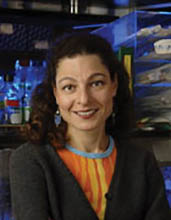
Research
We study the transcriptional and epigenomic control of inflammation – an evolutionarily conserved protective response to infection or injury. When deregulated, inflammation is pathogenic and has emerged as a driver of many diseases from autoimmunity to neurodegeneration. Central to the inflammatory response are macrophages – innate immune cells that infiltrate the site of invasion and produce numerous cytokines, chemokines, tissue degrading enzymes to fight pathogens. In recent years, however, we learned that macrophages are very diverse in developmental origin, transcriptomic and metabolic profiles, reside in different niches in the body and perform different, even reciprocal functions.
One direction of our work is to understand the biology of so-called ‘homeostatic’ or ‘tissue-repair’ macrophages, which are at the opposite end of the transcriptomic and functional spectrum from their inflammatory counterparts. The anti-inflammatory phenotype of these macrophages is triggered by certain cytokines, e.g., IL4, however, other stimuli, including the adrenal hormones glucocorticoids, elicit a similar state. We use genetic, biochemical and genomic approaches to determine how these disparate pathways converge, and what key shared nodes – transcription factors and coregulators – establish the core program of homeostatic macrophage polarization.
Another project focuses on RNA Polymerase-2 promoter-proximal pausing in inflammatory gene expression. Historically, Pol2 recruitment to target promoters was considered the final rate-limiting step for gene transcription. However, we and others have shown that >75% of signal-responsive genes are activated at a later step, whereby Pol2 initiates transcription, but ‘pauses’ ~100 nt downstream of promoters until a signal releases it from the pause enabling productive elongation. The specific role of this regulatory checkpoint in inflammation is unknown. Using cultured macrophages, mouse models of inflammatory diseases and, recently, synovial biopsies from the rheumatoid arthritis patients, we discovered that disrupting Pol2 pause dramatically re-programs inflammatory macrophages and reduces arthritis severity in vivo. This exciting project investigates Pol2 pausing as a potentially druggable step in inflammation control.
The third area is neuroinflammation and microglia – the specialized macrophages of the central nervous system. Our lab has long been interested in transcriptional coregulators, in particular, the glucocorticoid receptor cofactor GRIP1/NCoA2. Loss of GRIP1 in mouse macrophages attenuates the anti-inflammatory functions of glucocorticoids resulting in more severe inflammatory diseases. Surprisingly, GRIP1 deletion in microglia/macrophages was protective from neuroinflammation in the mouse model of multiple sclerosis, suggesting that GRIP1 actions in microglia vs. peripheral macrophages may differ. We seek to understand these differences and, more broadly, ways to microglia manipulate to combat neuroinflammatory diseases.
Current Projects:
- Epigenomic control of inflammation
- Transcription factors and coregulators
- RNA Polymerase II pausing in macrophages
- Macrophage programming
- Microglia in neuroinflammation
Bio
Dr. Rogatsky obtained MSc in Neuroscience in The Weizmann Institute of Science in Israel in 1993, and PhD in Basic Biomedical Sciences in New York University School of Medicine in 1997. Following postdoctoral training at the University of California San Francisco under the mentorship of Keith Yamamoto, she returned to New York in 2004 and established her research lab in the Hospital for Special Surgery with a Joint appointment as an Assistant Professor in the Microbiology and Immunology Department at WCM. Since 2015, Dr. Rogatsky has been a Senior Scientist at HSS and Professor of Microbiology and Immunology at WCM.
Distinctions:
- 1999 Parker B Francis Postdoctoral Fellowship in Pulmonary research
- 2002 Senior Postdoctoral Fellowship from Leukemia and Lymphoma Society
- 2008 Endowed Fellow: Robert and Gillian Steel Fellowship in Musculoskeletal Research
- 2015 Endowed Chair: Robert & Gillian Steel Chair in Advanced Therapeutics
